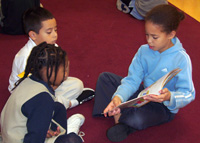 Education in Providence Education in Providence
In spite of the advances for two-way immersion (TWI) education at the end of the 1970s, advocates for this model encounter new challenges today. On the national level, The No Child Left Behind Act of 2001 removed the term bilingual education from federal education policies. The act renamed the Office of Bilingual Education and Minority Languages Affairs (OBEMLA) the Office of English Language Acquisition, Language Enhancement, and Academic Achievement for Limited English Proficient Students, signaling an emphasis on English acquisition over the development and maintenance of bilingualism among our youth. These changes occurred at the same time that a privately-funded attack on bilingual education resulted in the passage of Massachusetts' initiative "Question 2" in 2002, which invalidated one of the oldest bilingual education laws in the country. Ron Unz, the primary advocate and financier of this legislation, also spearheaded Proposition 227 in California in 1998 and Proposition 203 in Arizona in 2000. Both initiatives passed with overwhelming support.
In Providence, Rhode Island, immigration has resulted in a majority of non-English speaking students in the public school system. Of these students, Seventy-eight percent speak Spanish, many of them children of first generation immigrants from the Dominican Republic, Guatemala, Mexico, and El Salvador. Although several factors contribute to the poor performance of these students, a recent study of English Language Learners (ELLs) in Providence suggests that the district is failing Latina/o youth. Under severe economic pressures precipitated by reduced contributions from the governor to public education, the district has scaled back dual language curriculum at the one TWI school in the district, Alfred Lima Elementary, and English as a Second Language instructors are in line to receive layoff notices in the spring 2005. These decisions sharply contrast with educational research that suggests dual language is perhaps the ideal way of countering the effects of discrimination against language and racial minorities. In their review of two-way immersion programs in the United States and Canada , G á ndara and Genesee argued, "Dual-language programs … conceptualize non-English languages as a resource for English learners and as enrichment for English speakers. Thus, by valuing other languages, dual-language programs give these languages, and their speakers, greater prestige. The greater esteem in which the non-English speakers are held is thought to reduce prejudice against them."
For those who value bilingual education, there is still hope. One TWI elementary school currently thrives in Rhode Island: the four year-old International Charter School (ICS) in Pawtucket , Rhode Island , which serves 242 students (and will enroll 270 students K-5 in 2005-2006). Drawing from an ethnically and socioeconomically diverse pool of families in Providence, Pawtucket, and Central Falls, ICS offers two dual-language strands: Spanish-English and Portuguese-English. Its "high performing" status and the large number of Portuguese, Spanish, and creole speaking families in the area have generated a wait list for admission and local support, including volunteer and service learning programs with Brown University students and faculty. The ICS dual language model illustrates to its students and the community that multilingualism and cross-cultural communication matters and that students from broadly different backgrounds can achieve success equally.
"According to district data sources, more than a majority (56%) of all PPSD [ Providence Public School District ] students come from non-English-speaking households… At the same time, available district data suggest that most PPSD students whose first language is not English-both in the ESL/Bilingual programs and in the mainstream-are struggling academically."
-The Education Alliance at Brown University evaluation report of ESL/Bilingual Education Programs in Providence Public Schools, March 2003 |
|